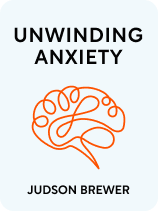

This article is an excerpt from the Shortform book guide to "Unwinding Anxiety" by Judson Brewer. Shortform has the world's best summaries and analyses of books you should be reading.
Like this article? Sign up for a free trial here.
Are there benefits of anxiety? Why do some people believe anxiety helps them?
In Unwinding Anxiety, Dr. Judson Brewer claims that many people object to receiving anxiety treatment because they believe there are benefits to anxiety. However, he disputes these claims.
Learn why Brewer suggests there are no advantages to anxiety.
Why There Are No Benefits of Anxiety
Brewer says that one of the benefits of treating anxiety as a habit is that doing so allows us to analyze the rewards of our anxious behavior. In a habit loop, a reward is any result that reinforces the behavior. For example, if you feel anxious and eat some potato chips, you enjoy a salty snack, your body enjoys a dopamine hit as it processes the carbohydrates, and your mind (possibly) enjoys a brief respite from whatever caused the anxiety. This makes people believe that there are benefits of anxiety. These short-term rewards are part of the reason we get addicted to anxiety even though it has numerous long-term consequences.
Brewer argues that a key step in breaking the anxiety habit is changing the value we place on anxiety’s rewards. He suggests that if we recognize that these short-term benefits aren’t actually that fulfilling, we’ll be less apt to continue thinking and behaving anxiously. Then, if we substitute non-anxious behaviors that offer better rewards, we’ll learn to choose those behaviors over anxious ones.
Updating Your Reward Value
According to Brewer, the trick to seeing that anxiety is unrewarding is to realize that our brains often overestimate the value of anxiety-related rewards. In other words, he claims that if you pay close enough attention, you’ll notice that potato chips don’t taste that good and that generally, the more of them you eat, the less you enjoy them and the worse you feel. The problem is that the brain takes a lot of factors into account when assessing reward value, and some of these factors aren’t directly relevant to the actual quality of the reward.
For example, if you enjoy looking at Instagram posts, your brain’s Instagram reward calculation might take into account Instagram’s informational and entertainment values, as you’d expect. But it’s also taking into account:
- Your emotional associations with your friends and family who post on Instagram.
- Your attachment to other things you care about (and follow on Instagram)—hobbies, sports teams, world events, and so on.
- Any stake you might have in people seeing and liking your posts.
- All previous instances of browsing Instagram in order to assuage anxious feelings.
This means that when your brain is weighing whether to open Instagram (or to keep browsing for a few more minutes), it’s assessing a lot more than just the enjoyableness of the experience itself. If you don’t realize that, you might find yourself using the app when you didn’t really mean to, or continuing to scroll even though you’re bored with the posts. The problem here is that your brain set a relatively high reward value for Instagram and then never bothered to reassess that value.
On the other hand, Brewer says, if you’re mindful, you can figure out how rewarding your behaviors actually are. For example, if you find yourself scrolling through Instagram when you’re anxious, simply pay attention to what that’s like. How much do you enjoy the posts? Are you really interested in peoples’ updates? And when you’re done, do you feel more or less anxious than before? Do you feel guilty for having spent your time this way?
In many cases, you might find that anxiety-driven behaviors (such as procrastination via social media, problem eating, substance use, and so on) aren’t actually very rewarding in their own right. When you look at the behavior itself and notice how it makes you feel moment by moment, you might find that you don’t even like it very much, or that you like it in much smaller doses than you thought. Realizing this makes it much easier to change unwanted behaviors.
Anticipation Muddles Reward Value
Reward value is further complicated by the way the brain assesses the anticipation of a reward relative to the reward itself. In Atomic Habits, James Clear explains that our brains give us a pleasurable dopamine spike both when we receive a reward (say, stumbling across a funny cat video) and when it thinks we’re about to receive a reward (say, when we open Instagram or pull out our phones). Crucially, the brain puts a much stronger weight on craving something than on actually receiving that thing.
The purpose behind this anticipatory spike is to motivate us to act—in a survival sense, our brains want us to be excited to go get food, not just to feel good when the food happens to end up in our mouths. The side effect, however, is that we conflate our cravings for something with the thing itself and then have a hard time telling how pleasurable that thing actually is once we have it.

———End of Preview———
Like what you just read? Read the rest of the world's best book summary and analysis of Judson Brewer's "Unwinding Anxiety" at Shortform.
Here's what you'll find in our full Unwinding Anxiety summary:
- How to recognize and counteract anxiety with mindfulness
- Why anxiety becomes is toxic if left untreated
- A three-step method for treating anxiety






